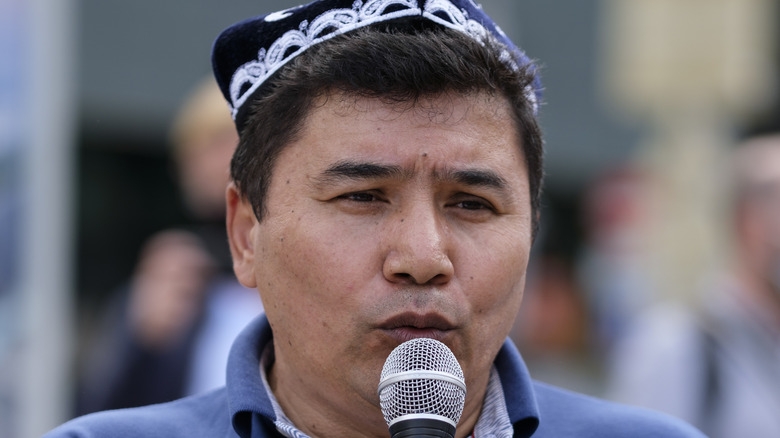
Thierry Monasse/Getty Images
Beginning in 2014, human-rights advocates began raising concerns about China and its treatment of the Uyghurs (or any of multiple alternate spellings), an ethnic community in the country's far northwest (via The Economist). According to Human Rights Watch, the Chinese have forcibly detained as many as 1 million Uyghurs and forced them into "political education" camps. There, allegations have emerged that the detainees have been tortured, sexually abused, and trafficked into forced labor, among other abuses. Meanwhile, outside of the prison camps, Uyghurs are allegedly subject to mass surveillance, random detainments and "disappearances," forced sterilizations, and systematic erasure of their religion and culture. Indeed, accusations have even emerged that China is attempting a genocide of the Uyghur people. And as Beijing hosts the 2022 Winter Olympics, the matter — along with China's larger pattern of alleged human rights abuses — has cast a shadow over the games, as the University of Chicago News notes.
If you or anyone you know has been a victim of sexual assault, help is available. Visit the Rape, Abuse & Incest National Network website or contact RAINN's National Helpline at 1-800-656-HOPE (4673).
The Uyghurs are a Muslim, Turkic group
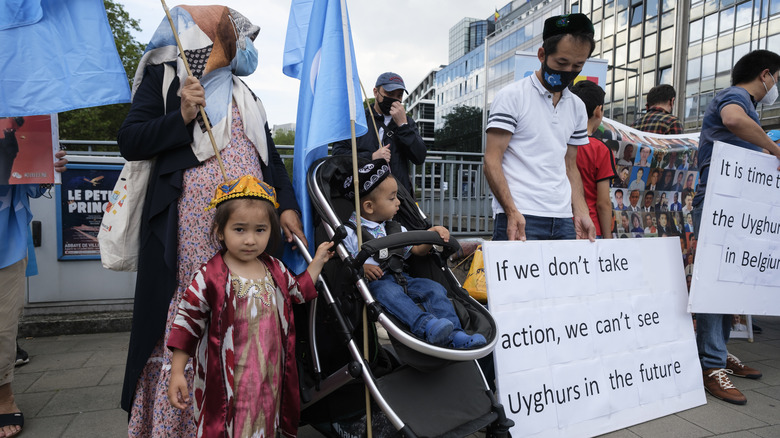
Thierry Monasse/Getty Images
According to BBC News, there are about 12 million Uyghurs living in China's Xinjiang region, where East Asia gives way to Central Asia. Like the overwhelming majority of people in Central/West Asia, the Uyghurs are Muslims. Further, they have more in common culturally and ethnically with Turks than they do with the Eastern Chinese.
History Today says the Uyghurs have been in their part of China since the sixth century, and by the 11th century, they and other people groups in the region were almost uniformly Muslim. Indeed, the region was a collection of Islamist city-states — ruled by Caliphs — until the middle 1700s. At this point, they faced opposition from the Qing dynasty, which took power and ruled over the Muslim population (even its ruling elites). The Uyghurs would face opposition from their Chinese rulers over the centuries, with the Chinese putting down revolts in the region in the 1800s.
The Uyghur population has been diluted
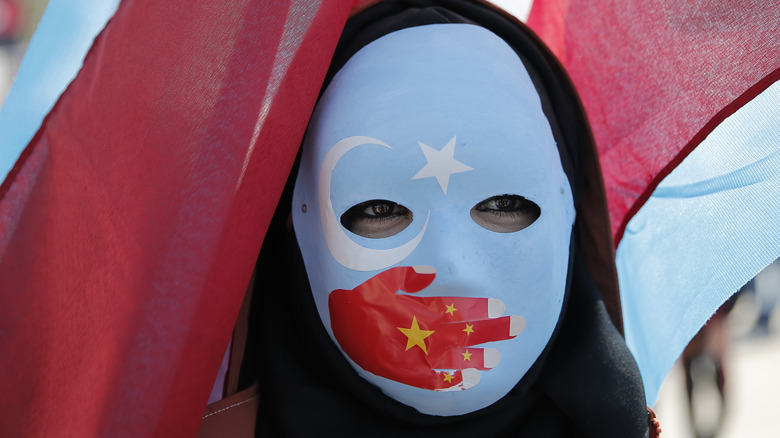
Lumiereist/Shutterstock
As reported by The Conversation, the Uyghur population in Xinjiang has declined since the People's Republic of China annexed the region in 1949. The National Library of Australia puts the group at 76% of the area's population in 1949. Now, the National Bureau of Statistics of China claims that Uyghurs make up only 42 percent of the population. The reason for the decline is allegedly dilution due to the immigration of Han people to Xinjiang.
In addition to a dilution of the Uyghur people, the Chinese Communist Party continues to clash with Uyghurs in regards to Xinjiang's status as a colony. While Muslim portions of the region continued to stand for independence and recognize the area as separate from China, the Chinese Communist Party rejects such notions and perceives such pushback as a danger to China as a whole. Indeed, Beijing's official position is that Xinjiang and its population as part of China, despite the previously mentioned dilution of the Muslim population and allegations of abuse against Uyghur people.
A group left behind
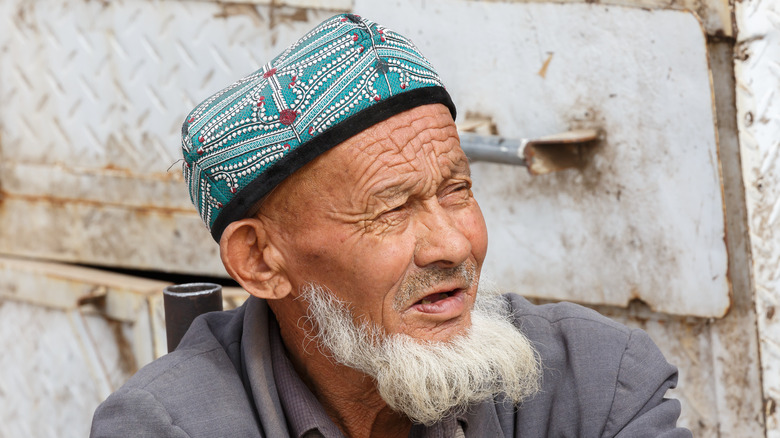
Chris Redan/Shutterstock
A reckoning of sorts came following the fall of the Soviet Union in 1991, History Today reports. During this period, predominantly-Muslim Central Asian republics that had once been part of the USSR — such as Uzbekistan and Kazakhstan — became independent nations, and the Uyghurs were left behind. Some Uyghur militant groups offered resistance, spurring the Chinese to invoke "Document No. 7," effectively a "strike hard" declaration against the group (via History Today).
The declaration and subsequent pressure applied to the Uyghurs paved the way for the current climate. According to History Today, this campaign is responsible for the detaining of Uyghur people for "'illegal religious activities" and being sympathetic to separatists without trial. Indeed, it's hard not to see the parallels between the past and present reports of harsh treatment of Uyghur people. Although the Uyghurs fought back, it often led to bloodshed, and they were never able to overpower the opposing Chinese state.
They are culturally distinct from China
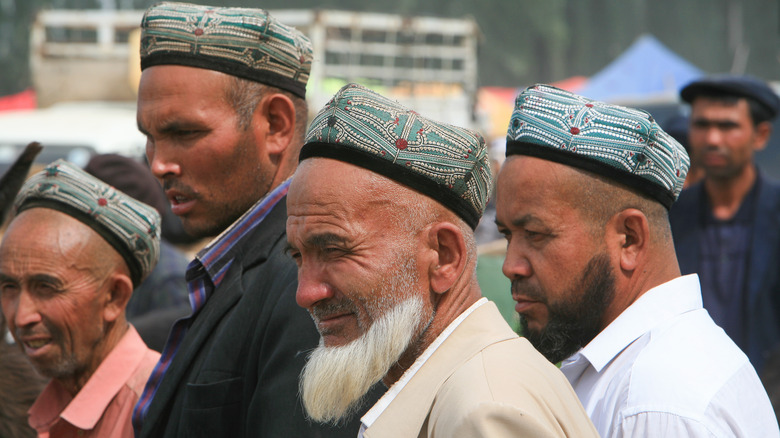
JordiStock/Shutterstock
The lines that are drawn on a map to separate one country from another often have little to do with the cultural, ethnic, and/or religious makeup of the peoples that live within those boundaries. This is especially true of nomadic groups that don't stay in one place for any significant length of time, such as the Uyghurs. Though they live in China and in a semi-autonomous region of the country, they have very little to do with the majority of the Chinese people, who live hundreds if not thousands of miles to the southeast.
As History Today notes, the Uyghurs are Muslim, in contrast to the largely Buddhist Chinese, and this Muslim-Buddhist conflict has been a thorn in the side of Uyghur-Chinese relations for centuries. Further, the Uyghurs have their own unique forms of dress, food, language, and other cultural markers that distinguish them from the Chinese and make them more similar to their Central/West Asian neighbors. Per The UN Refugee Agency, men often have beards, women typically wear longer dresses (regardless of their religion), and both wear cotton clothing. In addition, their language is more rooted in Uzbek and Turkish (the former more than the latter) than it is in Chinese. As for customs, they differ from other Muslim traditions in their love for musical ensembles and dance and the fact that women typically don't cover their faces (via China Highlights).
Ramping up Uyghur persecution
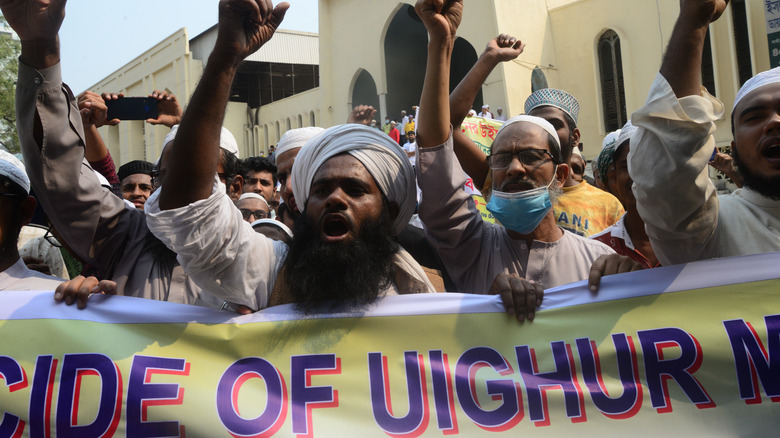
Mamunur Rashid/Shutterstock
Though the Uyghurs and the Chinese had not been seeing eye-to-eye for centuries, the persecution against the group ramped up in earnest in 2012, when Xi Jinping began asserting power (per History Today). Specifically, Xi began emphasizing uniformity and conformity across China and occupied Tibet, and as such, he introduced measures the publication called "draconian" in order to repress dissent. By 2016, those measures had reportedly evolved into mass surveillance and, as it applies to the Uyghurs, crackdowns on religious activity. Indeed, by some reports, the Chinese have destroyed mosques and shrines in the region.
By 2017, prison camps in the region began to grow, Council on Foreign Relations reports. By March 2021, the think tank estimates that 800,000 to 2 million Uyghurs and members of other Muslim ethnic minority groups — such as the Uzbeks and Kazakhs — had been sent to such camps. Meanwhile, the Chinese have allegedly targeted billions of dollars towards the maintenance and expansion of the facilities.
Speaking to NPR, Ramtin Arablouei said, "The CCP started a campaign in Xinjiang against what they called the three evils. ... Terrorism, extremism, and separatism." Arablouei noted that "separatism" also includes "ideological separatism," which has "allowed the government to cast any acts of Uyghur cultural expression as separatism.
Horrific allegations
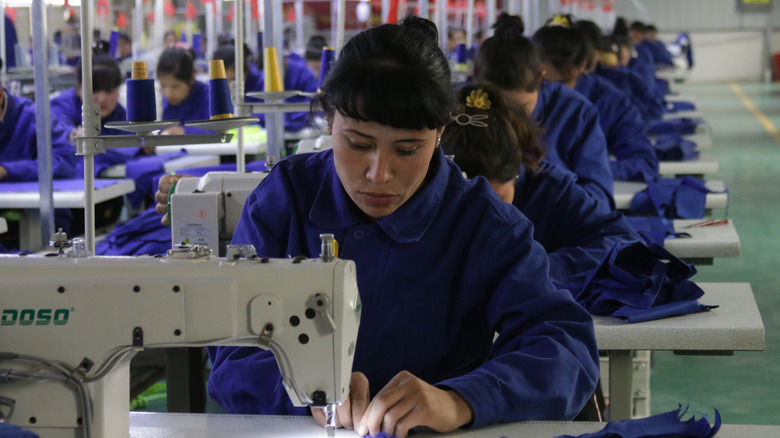
Azamat Imanaliev/Shutterstock
The allegations of abuse directed against the Uyghurs, coming from both the Uyghurs themselves and from international observers, are shocking. According to the Council on Foreign Relations, detainees sent to "reeducation camps" are forced to pledge loyalty to the Chinese governing party, renounce Islam, and learn Mandarin. Further, allegations have emerged that detainees have been tortured and sleep-deprived, while women have shared stories of sexual abuse and rape. Further, Uyghurs have been reportedly forced into labor, including working at garment factories. Indeed, in February 2022, as BuzzFeed News reported, fashion house Hugo Boss was forced to distance itself from a Chinese manufacturer after allegations emerged that it was benefitting from forced Uyghur labor.
Outside of the detention camps, Uyghurs claim they're subject to mass surveillance and random detentions on the flimsiest of pretexts.